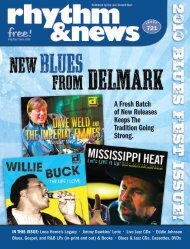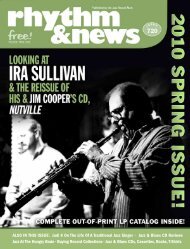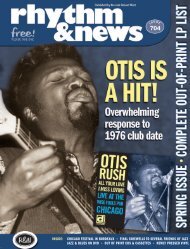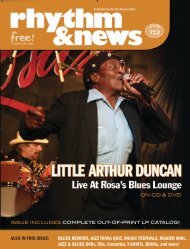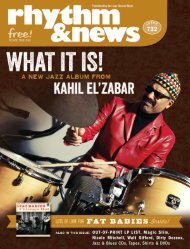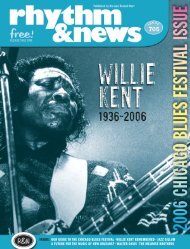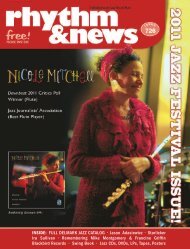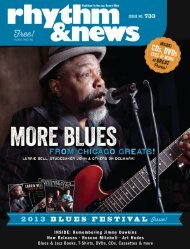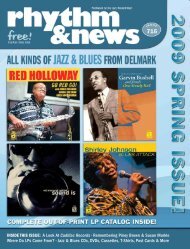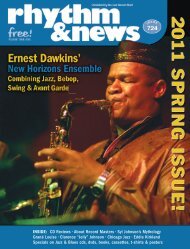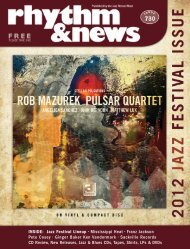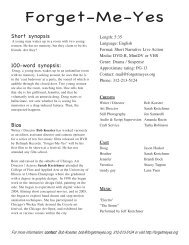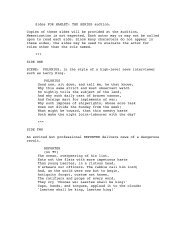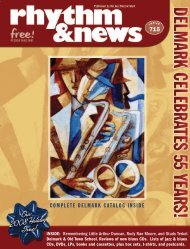INSIDE: Holiday music • Jazz & Blues on DVD ... - Delmark Records
INSIDE: Holiday music • Jazz & Blues on DVD ... - Delmark Records
INSIDE: Holiday music • Jazz & Blues on DVD ... - Delmark Records
You also want an ePaper? Increase the reach of your titles
YUMPU automatically turns print PDFs into web optimized ePapers that Google loves.
OTIS RUSH<br />
All Your Love I Miss Loving: Live at The Wise Fools Pub, Chicago<br />
CALL OR WRITE FOR A FREE CATALOG OF JAZZ AND BLUES: DELMARK RECORDS WWW.DELMARK.COM<br />
When Cold Day In Hell (<strong>Delmark</strong> 638) was released in 1976 it was the first full album Otis Rush had out<br />
in quite some time. Later that year a live show at The Wise Fools was recorded and now this CD represents<br />
the first complete document of Otis Rush live in Chicago. Otis is in peak form <strong>on</strong> all 12 s<strong>on</strong>gs: All Your<br />
Love, You’re Breaking My Heart, Please Love Me, High Society, Woke Up This Morning, Will My Woman Be<br />
Home T<strong>on</strong>ight, Mean Old World, Gambler’s <str<strong>on</strong>g>Blues</str<strong>on</strong>g>, It Takes Time, Sweet Little Angel, Motoring Al<strong>on</strong>g, Feel So<br />
Bad. DELMARK DE 781 (CD) --- Also available: So Many Roads, Live In Japan (<strong>Delmark</strong> 643).<br />
ZORA YOUNG<br />
Tore Up From The Floor Up<br />
Of her first <strong>Delmark</strong> CD Learned My Less<strong>on</strong> (<strong>Delmark</strong> 748) Living <str<strong>on</strong>g>Blues</str<strong>on</strong>g> magazine said “Her rough-edged<br />
cro<strong>on</strong> can raise welts or love bumps. She has the versatility to strut comfortably from back-alley funk to<br />
uptown jump sophisticati<strong>on</strong>.” Tore Up From The Floor Up features five original compositi<strong>on</strong>s, some choice<br />
covers and an interview. Guitarist Pete Allen provides most of the <str<strong>on</strong>g>music</str<strong>on</strong>g>al directi<strong>on</strong> while The Chicago<br />
Horns provide support <strong>on</strong> “Til The Fat Lady Sings” and “Ace Of Spades.” DELMARK DE 784 (CD)<br />
TAIL DRAGGER<br />
My Head Is Bald: Live at Vern’s Friendly Lounge, Chicago<br />
FEATURING BILLY BRANCH, LURRIE BELL & JIMMY DAWKINS<br />
A w<strong>on</strong>derfully dramatic showman Tail Dragger also possesses <strong>on</strong>e of the most authentic and distinct<br />
Chicago <str<strong>on</strong>g>Blues</str<strong>on</strong>g> voices ever. In 1998 his American People (<strong>Delmark</strong> 728) CD, was described as “tour de<br />
force Chicago <str<strong>on</strong>g>Blues</str<strong>on</strong>g>” by Art Tipaldi in <str<strong>on</strong>g>Blues</str<strong>on</strong>g> Revue. Those who have seen Tail Dragger perform know that a<br />
studio CD cannot fully capture the excitement of a live show. My Head Is Bald remedies that by presenting<br />
a live recording d<strong>on</strong>e <strong>on</strong> Chicago’s west side, where Tail Dragger currently performs every Sunday. The <strong>DVD</strong><br />
is highly enjoyable because it takes you right there—you can follow Tail Dragger as he moves around Vern’s<br />
interacting with the appreciative crowd. <strong>DVD</strong> is in high resoluti<strong>on</strong> stereo, DTS and Dolby 5.1 Surround<br />
Sound. With Bob Stroger and Kenny Smith. “One day this boy will take my place” —Howlin’ Wolf<br />
DELMARK DE 782 (CD); <strong>DVD</strong> 1782<br />
MISSISSIPPI HEAT<br />
One Eye Open: Live at Rosa’s Lounge, Chicago<br />
$14.99<br />
$14.99<br />
$14.99 / CD <str<strong>on</strong>g>•</str<strong>on</strong>g> $24.99 / <strong>DVD</strong><br />
FEATURING SPECIAL GUEST LURRIE BELL<br />
As bandleader and composer, Pierre Lacocque’s visi<strong>on</strong> has never wavered since he founded Mississippi<br />
Heat in 1991. “Mississippi Heat not <strong>on</strong>ly breathes new life into the classic sounds of Chicago <str<strong>on</strong>g>Blues</str<strong>on</strong>g> but<br />
they also uplift with joy and dedicati<strong>on</strong> everything they play. Pierre Lacocque is that rare younger generati<strong>on</strong><br />
harpist who’s absorbed the less<strong>on</strong>s of subtlety, silence and solo c<strong>on</strong>structi<strong>on</strong> from the masters.” —David<br />
Whiteis, Chicago Reader. Mississippi Heat’s lineup for this live recording is Inetta Visor, vocals; Lurrie Bell,<br />
vocal/guitar; Max Valldeneu, guitar; Chris “Hamb<strong>on</strong>e” Camer<strong>on</strong>, organ/piano; Spurling Banks, bass;<br />
Kenny Smith, drums. <strong>DVD</strong> c<strong>on</strong>tains high resoluti<strong>on</strong> stereo, DTS & Dolby 5.1 Surround Sound.<br />
DELMARK DE 783 (CD); <strong>DVD</strong> 1783<br />
$14.99 / CD <str<strong>on</strong>g>•</str<strong>on</strong>g> $24.99 / <strong>DVD</strong><br />
Albert Nicholas, c<strong>on</strong>tinued<br />
(Since the Kirby group was frequently tapped by Decca to back up artists<br />
in their blues catalog, it's too bad we miss a chance to hear Albert behind<br />
Roosevelt Sykes, Frankie "Half Pint" Jacks<strong>on</strong>, Trixie Smith or Peetie<br />
Wheatstraw.)<br />
Albert was reunited with Jelly Roll Mort<strong>on</strong> in 1940 for Bluebird and 1941<br />
for General/Commodore. Old friend Sidney Bechet was <strong>on</strong> the first date.<br />
Albert is <strong>on</strong>e of the few reed players who could fit in with Bechet, whose<br />
imaginative and overbearing, almost bullying dominance just didn't leave<br />
much room. I believe that Jelly wrote out, certainly influenced, some or<br />
all of Albert's solos <strong>on</strong> the 1929 Victor sessi<strong>on</strong>s -- removing some of<br />
Albert's uniqueness in the process -- but Albert was less inhibited <strong>on</strong><br />
these later sides. He takes the first solo <strong>on</strong> clarinet over the ensemble,<br />
followed by Bechet, with a more timid ensemble. Then Nick closes it out.<br />
A jukebox movie appeared in 1942 by Cee Pee<br />
Johns<strong>on</strong> (the drummer in the lindy-hop scene from<br />
Olsen & Johns<strong>on</strong>'s HELLZAPOPPIN') Which seems<br />
to be the Luis Russell band again being fr<strong>on</strong>ted. Luis<br />
is visible as is Nicholas who is heard cutting through<br />
the ensembles,. Albert left <str<strong>on</strong>g>music</str<strong>on</strong>g> in late '41, after<br />
a trio job with Zutty Singlet<strong>on</strong> at the Village<br />
Vanguard. He worked awhile as a subway guard,<br />
then for the U.S. government in Washingt<strong>on</strong>, DC.<br />
He was obviously well rested when he returned to<br />
New York in '45. He recorded with Art Hodes and<br />
Sidney Bechet for Blue Note. The band was rounded<br />
out with Pops Foster,b; Danny Alvin,dms.<br />
Nick also played a few nights with the Bunk Johns<strong>on</strong><br />
band, subbing for George Lewis when he had some<br />
severe dental work d<strong>on</strong>e.<br />
Rudi Blesch's book, SHINING TRUMPETS led him to start Circle<br />
<strong>Records</strong>. For his first sessi<strong>on</strong> he recorded, in January of '46, a trio:<br />
Nicholas,cl; D<strong>on</strong> Ewell,p; Baby Dodds,dms. Dodds also cut his first drum<br />
solos that January day. It's <strong>on</strong>e of my favorite Nick dates.<br />
January was a vintage m<strong>on</strong>th for Albert. There was also a Commodore<br />
sessi<strong>on</strong> led by C<strong>on</strong>d<strong>on</strong> but issued under Wild Bill Davis<strong>on</strong> (doubtless<br />
because of C<strong>on</strong>d<strong>on</strong>'s c<strong>on</strong>tract with Decca). Brunis is <strong>on</strong> tromb<strong>on</strong>e and<br />
Dave Tough <strong>on</strong> drums.<br />
In Feb., 1946 Albert went to California and joined Kid Ory who had<br />
exquisite taste in clarinetists: Omer Sime<strong>on</strong>, Barney Bigard, Darnell<br />
Howard, Jimmie No<strong>on</strong>e, etc. but the <strong>on</strong>ly Ory recording with Albert was a<br />
V-Disc sessi<strong>on</strong> made for servicemen. Fortunately they were 12" 78's with<br />
room to stretch out. Recorded May, 1946 with Mutt Carey,tp, etc.<br />
Nicholas was back in New York in September of '46, at Jimmy Ryan's.<br />
Through much of 1947, Rudi Blesh promoted, wrote and narrated a<br />
series of radio programs, THIS IS JAZZ, which found Albert working <strong>on</strong><br />
the March 1, '47 program, with Mugsy Spanier,tp; George Brunies,tb;<br />
James P. Johns<strong>on</strong>,p; Danny Barker,g; Pops Foster,b; Baby Dodds,dms.<br />
The whole series of 13 programs was released <strong>on</strong> CD in toto by<br />
<str<strong>on</strong>g>Jazz</str<strong>on</strong>g>ology <strong>Records</strong> not l<strong>on</strong>g ago. .<br />
Rudi Blesch also did an album of Nicholas singing and playing four creole<br />
s<strong>on</strong>gs for Circle with Jammes P.Johjns<strong>on</strong>, Danny Barker and Pops<br />
Foster. He recorded this tune, June 12, 1947, before Bechet, who had a<br />
European hit with it, Les Oni<strong>on</strong>s:<br />
By '48 he was with the Ralph Sutt<strong>on</strong> Trio which included a successful gig<br />
at the Barrel <strong>on</strong> Delmar Blvd, in St.Louis - prob. c.50 - it was still the topic<br />
of much discussi<strong>on</strong> when I went to St.Louis in '51. (By which time Miles<br />
Davis was at the Barrel. The Barrel and other jazz clubs in the 5600 Block<br />
of Delmar named my label.)<br />
I must credit John Chilt<strong>on</strong>'s excellent WHO'S WHO IN JAZZ for the basis<br />
of this whole discussi<strong>on</strong>. He menti<strong>on</strong>s that Nick led "his own groups in<br />
and around Los Angeles from '49 to '53".<br />
The California jazz scene had heated up during WW2, with veterans of<br />
the big bands settling in Los Angeles to find work in film studio bands.<br />
This was accompanied by a tremendous populati<strong>on</strong> expansi<strong>on</strong> due to the<br />
defense and aero industries and black migrati<strong>on</strong> from Texas, Louisiana,<br />
etc. Lu Watters had started a movement reviving the sound of the Oliver<br />
band. It's the San Francisco band of trumpeter Bob Scobey, formerly with<br />
the Watters band. Here they are with Jack Buck,tb; Burt Bales,p; Squire<br />
Girsback,b; Fred Higuera,dms. and Albert.<br />
After a six-week job in Bost<strong>on</strong> with Rex Stewart, Albert moved to France,<br />
probably influenced by Rex and Bechet (who had spent a lot of time<br />
there) and his f<strong>on</strong>d memories from his 20's tour, as evidenced in his<br />
interview with Roger Richard.<br />
The move to Europe was permanent except for a few brief visits back to<br />
the states. He recorded extensively for French and Norwegian Phillips,<br />
Danish Storyville, Polish Nigrania, and French Columbia with Andre<br />
Reweliotty, Claude Luter, Claude Bolling, Adrian Bentz<strong>on</strong>, the Big Chief<br />
Swing Group, as well as numerous sessi<strong>on</strong>s under his own name, usually<br />
with the best French but sometimes Danish, Dutch, Polish, Swiss or<br />
Italian <str<strong>on</strong>g>music</str<strong>on</strong>g>ians or American expatriates such as Kansas Fields, Joe<br />
Turner -- Albert got around. N<strong>on</strong>e of these albums were issued in our<br />
country or bulk-imorted, sad to say.<br />
I learned that <strong>on</strong>e of our regular customers at <str<strong>on</strong>g>Jazz</str<strong>on</strong>g><br />
Record Mart was Albert's brother, whom I wish I could<br />
have talked with for this discussi<strong>on</strong>. Albert told me this<br />
motivated Nick in 1959 when fellow clarinetist and<br />
<str<strong>on</strong>g>Jazz</str<strong>on</strong>g> Ltd.owner Bill Reinhardt brought him to Chicago<br />
as a replacement while he took a vacati<strong>on</strong>. I did two<br />
albums during that time organized by Art Hodes, who,<br />
of course had d<strong>on</strong>e the Blue Note date. We warmed<br />
things up with a quartet sessi<strong>on</strong> using Art's regular<br />
bassist of the time, Earl Murphy, as well as <str<strong>on</strong>g>Jazz</str<strong>on</strong>g> Ltd's<br />
drummer, New Orleansian Freddy Kohlman. It had<br />
been some time since Nick had recorded with rhythm<br />
and he met the challenge well.<br />
We then cut another album with a full seven-piece<br />
band. On a visit to the Red Arrow to see a Lil<br />
Armstr<strong>on</strong>g group, Nick asked us to use tubaist Mike Walbridge (later for<br />
decades with the Salty Dogs) <strong>on</strong> this sessi<strong>on</strong>. I wanted guitarist Marty<br />
Grosz so that made for an unusual rhythm secti<strong>on</strong> sound. Nap Trottier<br />
<strong>on</strong> cornet and Floyd O'Brien <strong>on</strong> tromb<strong>on</strong>e were Art's sidemen whenever<br />
he worked a full band. Freddy Kohlman filled out the rhythm secti<strong>on</strong>. It<br />
was great to hear Floyd O'Brian in pers<strong>on</strong>! He had played with Danny<br />
Alvin but I arrived in Chicago too late to have heard him more than <strong>on</strong>ce<br />
or twice. (Alvin passed <strong>on</strong> shortly after my arrival in '58.)<br />
While in Chicago, Albert also did two LP's with a Doc Evans unit with<br />
Knocky Parker for the Audiophile label. I believe some of the sides<br />
credited to him were actually by another clarinetist temporarily in grief<br />
with the uni<strong>on</strong> - or was it the other way around. Anyway, I believe it might<br />
have been Omer Sime<strong>on</strong>.<br />
Of course there were more tours and more recordings when Albert<br />
returned to Europe where he eventually resided in Geneva. Here he got<br />
married and eventually returned to Chicago in 1970.<br />
The Albert I recorded in 1959 could be described as "grumpy" and may<br />
explain the brevity of many of his gigs. But his new love seemed to have<br />
brought about a w<strong>on</strong>derful mellowness. He sat in at the new <str<strong>on</strong>g>Jazz</str<strong>on</strong>g>,Ltd, at<br />
Sloppy Joe's where the Salty Dogs held forth, and at Basin Street <strong>on</strong><br />
Rush where George Brunis had the band. George introduced Albert to<br />
the crowd and noted that he could not play <strong>on</strong> the stand with him in New<br />
Orleans because of the segregati<strong>on</strong> laws of that time. (A respected jazz<br />
activist had <strong>on</strong>ce said George was a racist, which may have been a factor<br />
when we picked Floyd O'Brien for the <strong>Delmark</strong> album.)<br />
While visiting other relatives in New Orleans, Albert participated in a TV<br />
show in New Orleans w. Zutty Singlet<strong>on</strong>, Danny Barker, Kid Thomas, Kid<br />
Sheik. Albert returned to Switzerland, did a few more records and gigs<br />
before he died there in Basle September 3, 1973.<br />
Albert's clarinet style was not successfully copied as far as I know. I<br />
always thought the six Bluebird sides by Three's A Crown were by him but<br />
the discography lists Paul Ricci so I guess I better pay him more<br />
attenti<strong>on</strong>. BIBLIOGRAPHY:<br />
A.N. JAZZ INFO 9-20-40 (Herman Rosenberg & Gene Williams)<br />
Very extensive coverage of early N.O. gigs, 1st<br />
world tour thru Zutty gig (not l<strong>on</strong>g before retirement.<br />
A.N. Storyville #57 (FEB-MAR'75), Roger Richard Talks To A.N.<br />
and a great many other books by Le<strong>on</strong>ard Feather<br />
11



